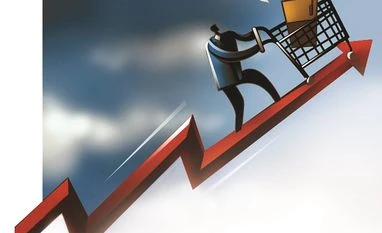US consumer prices were unchanged in June and retail sales fell for a second straight month, pointing to tame inflation that could diminish prospects of a third interest rate increase from the Federal Reserve this year.
The soft domestic demand could also temper expectations of strong acceleration in economic growth in the second quarter.
The Labor Department said on Friday that the unchanged reading in its Consumer Price Index came as the cost of gasoline and mobile phone services declined further. The CPI's drop of 0.1 percent in May and the lack of a rebound in June could trouble Fed officials who have largely viewed the recent moderation in price pressures as transitory.
Policymakers are confronted with benign inflation and a tight a labor market as they weigh a third rate hike and announcing plans to start reducing the central bank's $4.2 trillion portfolio of Treasury bonds and mortgage-backed securities.
In the 12 months through June, the CPI increased 1.6 percent - the smallest gain since October 2016 - after rising 1.9 percent in May. The year-on-year CPI has been softening steadily since February, when it hit 2.7 percent.
Economists had forecast the CPI edging up 0.1 percent last month and climbing 1.7 percent from a year ago.
More From This Section
The so-called core CPI, which strips out food and energy
costs, edged up 0.1 percent in June, rising by the same margin for three straight months. The core CPI increased 1.7 percent year-on-year after a similar gain in May.
The Fed has a 2 percent inflation target and tracks a measure which is currently at 1.4 percent.
The dollar extended losses against a basket of currencies on the data while prices for U.S. government bonds rose.
Fed Chair Janet Yellen told lawmakers on Wednesday that the recent cool off in inflation was the result of "a few unusual reductions in certain categories of prices" that would eventually drop out of the calculation.
Broad WeaknessLast month, gasoline prices fell 2.8 percent after tumbling 6.4 percent in May. Food prices were unchanged after rising for five straight months. The cost of cellular phone services fell 0.8 percent, extending their decline amid price competition among service providers.
There were also declines in airline fares and prices for apparel, household furnishings, new motor vehicles, and used cars and trucks. Rental costs rose 0.3 percent, matching May's gain. Owners' equivalent rent of primary residence increased 0.3 percent after advancing 0.2 percent in May.
In a separate report, the Commerce Department said retail sales fell 0.2 percent last month, weighed down by declines in receipts at service stations, clothing stores and supermarkets. Americans also cut back on spending at restaurants and bars, as well as on hobbies.
May's retail sales were revised to show a 0.1 percent dip instead of the previously reported 0.3 percent drop. Retail sales rose 2.8 percent year-on-year in June.
Excluding automobiles, gasoline, building materials and food services, retail sales slipped 0.1 percent last month after being unchanged in May. These so-called core retail sales correspond most closely with the consumer spending component of gross domestic product.
Tepid consumer spending and a moderate pace of inventory investment restricted economic growth to a 1.4 percent annualized rate in the first quarter. The Atlanta Federal Reserve is forecasting GDP to have risen at a 2.6 percent annualized rate in the second quarter. Last month, auto sales edged up 0.1 percent after rising 0.9 percent in May. Receipts at service stations dropped 1.3 percent, reflecting lower gasoline prices, after declining 3.0 percent in May. Sales at building material stores rose 0.5 percent. Receipts at clothing stores fell 0.1 percent. Department store sales tumbled 0.7 percent. They are being undercut by online retailers, led by Amazon.com.
That has led to some retailers, including Macy's, Sears and Abercrombie & Fitch to announce shop closures. Sales at online retailers rose 0.4 percent last month after increasing 0.8 percent in May. Receipts at restaurants and bars fell 0.6 percent, the biggest drop in six months.
Food and beverage store sales declined 0.4 percent, also the largest fall in six months. Sales at sporting goods and hobby stores decreased 0.6 percent.
)